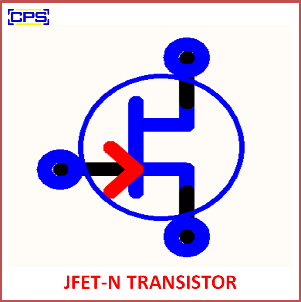A JFET-N transistor (Junction Field Effect Transistor – N-channel) is a type of field-effect transistor (FET) where the current flows through a semiconductor channel that is controlled by an electric field. In an N-channel JFET, the current flows from the source to the drain, and the flow of current is controlled by applying a voltage to the gate terminal, which creates a depletion region in the channel.

Key Features of JFET-N:
- N-Channel:
- The channel through which current flows is made of n-type semiconductor material.
- The current carriers are electrons, which have higher mobility than holes (the charge carriers in p-type material), making N-channel JFETs faster and more efficient.
- Gate Control:
- The gate is reverse-biased, meaning it does not conduct any current under normal operation. The voltage applied to the gate controls the width of the channel and, thus, the amount of current that can flow from the source to the drain.
- Depletion Mode:
- When a negative voltage is applied to the gate (relative to the source), it creates a depletion region that narrows the channel and reduces the current flow.
- The current stops completely when the gate voltage reaches a certain threshold, called the pinch-off voltage.
- Unidirectional Current Flow:
- The current flows from the source to the drain in an N-channel JFET, and the direction of current is controlled by the voltage applied to the gate.
Applications:
- Amplifiers: Used in analog circuits to amplify signals, especially in low-noise applications.
- Switches: Can be used as electronic switches in digital circuits.
- Voltage-Controlled Resistor: JFETs are used in applications where the resistance needs to be controlled electronically, such as in oscillators or variable resistors.
Advantages:
- High Input Impedance: JFETs have very high input impedance, meaning they draw minimal current from the signal source.
- Low Noise: Because the gate is reverse-biased, JFETs exhibit low noise, making them suitable for high-precision and sensitive applications.
Disadvantages:
- Non-Linear Characteristics: JFETs are less linear compared to other transistors like MOSFETs.
- Limited Control Range: The current flow is more limited in a JFET compared to other types of FETs.
In summary, an N-channel JFET transistor is a key component in electronic circuits for signal amplification, switching, and voltage control due to its high input impedance and low noise characteristics.
